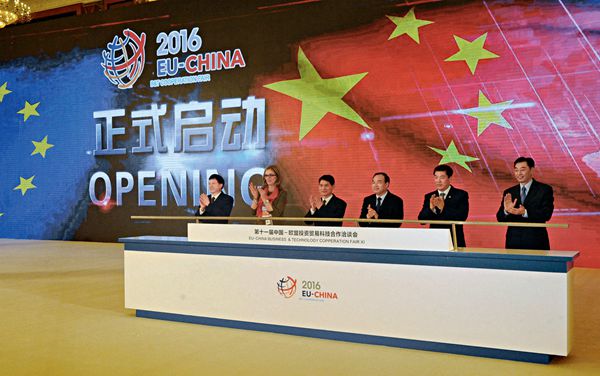Economic Ties Stabilize China-EU Relations
China Today by LI GANG, January 22, 2017 Adjust font size:
SINCE China and the EU first established diplomatic relations four decades ago, dialogue and cooperation have played key roles, in spite of occasional setbacks. Frequent diplomatic exchanges between European and Chinese leaders on official visits have elevated bilateral ties to a new level of stability and maturity. At the core of this stability lies rapidly developing economic relations and trade between China and the EU. Despite occasional disagreements on policy, win-win cooperation remains the main focus for both parties. Both the EU and China are committed to enhancing their partnership to bring peace, economic growth and reform.
Shaky Progress
2016 saw a number of incidents that struck a discordant note in the overall harmony of these bilateral ties. A ruling by the European Parliament on May 12, proved a hindrance to China’s bid for market economy status; 546 MEPs voted against treating China as a market economy and only 28 MEPs voted in favor, while 77 abstained. According to EU regulations, the European Commission must put forward a bill on whether market economy status should be granted to China, and this would only officially take effect after being voted through by both the European Parliament and the EU Council; the current resolution is, therefore, a “non-binding” one.
Another case in point was the referendum on Brexit on June 24. The unexpected move to leave the EU was made after 51.9 percent of Britain’s population voted in favor, versus 48.1 percent against. The decision had an immediate impact on economic agreements between China and the U.K. On July 29, just 11 hours before Britain was due to sign a deal with China and France to develop Hinkley Point nuclear power station, U.K. Business Secretary Greg Clark announced that the signing would be postponed. Fortunately, the decision to suspend the project was later overturned by new Prime Minister Teresa May.
In October, Chinese companies were challenged on two acquisitions, which somewhat chilled trading relations between China and Germany. The bid by China’s Fujian Grand Chip Investment Fund LP to acquire German microchip equipment manufacturer Aixtron, was withdrawn by Germany’s Federal Ministry for Economic Affairs and Energy, which stated that it would reappraise the deal. A few days later, the Ministry announced that it was suspending a Chinese consortium’s acquisition of LEDVANCE, a lamp brand of Osram, pending an investigation.
Focus on Win-Win Cooperation
In spite of these hiccups, China and the EU remain committed to win-win cooperation. Bilateral trade volume has risen and both sides are playing an increasingly important role in each other’s trade. Eurostat reveals that the EU-China trade volume reached €520.75 billion in 2015. EU exports to China stood at €170.39 billion, forming 9.5 percent of the EU’s gross exports. Imports from China clocked in at €350.36 billion, accounting for 20.3 percent of the EU’s gross imports. In the last decade, bilateral trade volume more than doubled. Today, China is the EU’s second largest trading partner, while the EU has remained China’s top trading partner for 12 consecutive years.

The 11th EU-China Business and Technology Cooperation Fair, whose aim is to explore cooperation in promoting the transition to a green economy and sustainable development of enterprises, opened in Chengdu on November 3, 2016.
In addition, increased mutual investment presents considerable potential for further growth. According to Eurostat, the EU’s direct investment stock in China had kept increasing between 2008 and 2012. In 2011, it passed €100 billion for the first time and the following year it continued to grow, reaching €120.73 billion, a 120 percent increase over 2008’s figure.
